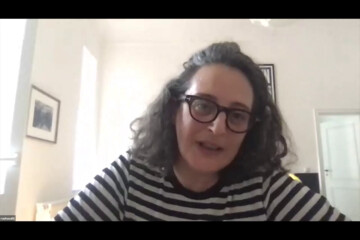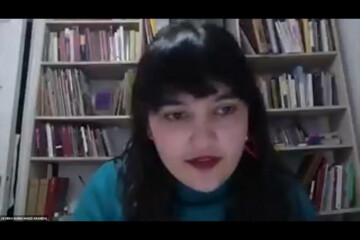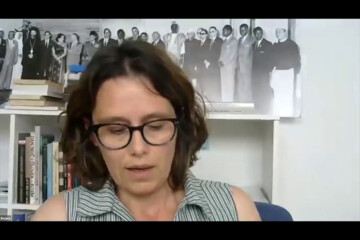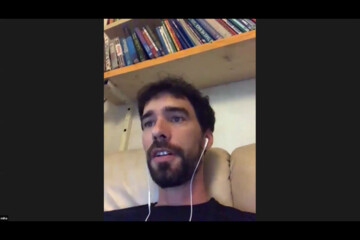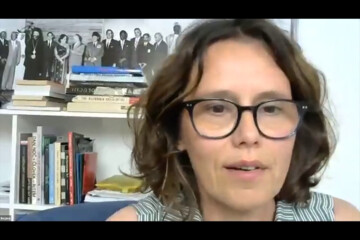I live between Beirut and Berlin, and chose to be in Berlin when the lockdown was implemented. After the first week, between observing the stillness from the apartment window, and following the news broadcasts shifting into overdrive, the minutiae of the lives on our street became notable, their presence amplified in carless streets and plane-less skies: the slow budding of trees, the return of some birds, the step by step awakening of spring. To distract my attention from the unutterable fears about what was to come, I observed the commonplace blossoming of life as particularly joyous, and convinced myself that the trees, the wild weeds, the insects and the birds were having the best springtime ever, to be elated with the sudden fall in carbon emissions, the lessening of feet stomping around them and the drastic reduction of noise. To a large extent, the lockdown provided the unimaginable experience and spectacle of what would happen if economic production and commerce regressed to the supply of basic essentials – the very antithesis of neoliberal capitalism. The British Marxist historian Eric Hobsbawm labelled the history of the 20th century ending with the Cold War as the “age of extremes”, and I am tempted to name the history of the decades that followed and up until our present moment the “age of excess”, because under the aegis of neoliberal capitalism, the relentless and foolhardy pursuit of economic “growth” has become no longer tenable, the creed has shifted to excessive, insatiable consumption. The promise of bounty was replaced with the promise of plenty, self-realisation replaced with narcissism, and the “happy” became the “successful” (fewer and fewer) who accumulate ever more transgressive amounts of wealth. Negotiations over colonising and mining the moon, I remind you, are on-going, totally oblivious of the COVID-19 pandemic.
For lack of an ideological or immaterial utopia that is not tailor-made to communities of the “chosen few” (like the billionaires, the congregation of a cult, or members of a so-called pure race) dystopia has pervaded the horizon of → imagination in our age of excess. In art, literature, film, and song. When it is imagined well and masterfully crafted, we deem it “visionary” because of its predictive aptness. (Think for instance, of how we rate Philip K. Dick’s “fantastical” fiction in retrospect today.) Dystopia is so commonplace that even the cable network dedicated to weather forecasting, (i.e. the Weather Channel) has been producing star-studded fiction films that depict in sight, sound and visual effects massive “natural” catastrophes, and it does not do this out of a commitment to raising awareness about global warming, but for the purpose of entertainment. The narratives of these films celebrate the triumph of man over mega-adversity, which is a manifestation of the pathos of our age. We cannot possibly celebrate that trees are better inhabitants of this planet that usually outlive us. And when so-called natural disasters happen and flood, burn or destroy lives, cities, forests and nuclear power plants, they are “natural” phenomena, far beyond of our doing. In fact, insurance companies refer to them as “acts of God”. There has been much debate on whether this pandemic is a “natural” catastrophe, or a systemic consequence of the conduct of our lives. The disruption that it has brought to the “global economy” seems to be the bigger disaster that leaders, governments and experts from a variety of fields are most concerned about “recovering from”. In spite of the plethora of statisticians, highfalutin’ TED-talkers, futurologists and computer-generated predictive modelling experts labouring day and night to foresee, foretell and sketch what the near future might be like, most societies are navigating the current upheaval without a real vision for what really ought to be done to avoid another global dystopia. Save for a few marginal exceptions, far and wide elected politicians, dictators, autocrats and their coterie of sly pundits and media spokespeople perceive this pandemic as essentially some sort of a hiatus in the grand scheme or a sinister glitch. The best plan they have is to go back exactly to right before the lockdown was deemed unavoidable. → After a vaccine approved by the various licensing bodies was made available worldwide we were reassured that we would go back to “normal”, or a “new normal”, because now we are aware that another pandemic might be just around the corner.
I belong to a community of people who believe that we had it coming. In fact, dystopia was and is the relentless pursuit of excess and not its sudden halt. The lockdown was a necessary, timely, healthy, and lucid interval. From the perspective of an independent curator, whose social and financial stability is like walking a tightrope across the deep chasm between social status and economic precarity, the lockdown was also a time of anxious worrying about survival, but this is my own personal condition, I don’t want to blow it up into a collective one, and the precarity I was enduring was the outcome of neoliberal capitalism. What I want to retain from this time of a pause is that was an existential, cognitive and affective necessity.
The contemporary meanings of “lucid” (from the Latin Lucidus) are light (from lux and the genitive lucis), bright, clear, and by extension figuratively, “easy to understand, free from obscurity, bestowed with intellectual clarity”. A “lucid interval” was a commonplace expression in Medieval Latin, that referenced the period of calm between two storms, or the “interval of temporary sanity” in legalese, in other words a set of unexpected reasonable actions and expressions by those deemed mentally unfit, unwell or unbalanced. The expression fell into disuse in our contemporary diction, but remains meaningful in the lexicon of clinical psychology. I fell on it by pure chance during the lockdown while researching other notions, and it felt like an epiphany because I realised that what scared me most was going back to that which we were prior to the pandemic, and not the prospect of our lives changing radically.
This pandemic amplified and revealed the veiled dissonances, delusions and fractures within the global economic system. They are what we are called upon to reinvent: dogged consumption as the viable engine of economic prosperity, depreciation of the local to the benefit of hyperinflating the global, the total appropriation of time by capital (or the individual’s control over their own → temporality), to cite a few headline examples. In the fact that most of the planet’s population found itself subjected to the conditions of the pandemic, we were suddenly all connected beyond nation states, cultural, ethnic and class differences. We were obviously not equally protected, but we were all confronted with this one and same overarching condition, immigrants and natives, undocumented migrants and citizens, selves and others. It turns out that the culture of narcissistic indifference does not empower survival. We should have taken the SARS, MERZ and Ebola epidemies more seriously, they were not merely regional outbreaks of mutated viruses.
To a very happy few the lockdown was agreeable, but to most it was anxious, lonely and unsettling because, at some level, it was in essence like the enactment of insularity that right-wing ideologies advocate. And after the first week or two of hysterical hoarding of toilet paper or hand sanitiser, the longing for contact, for being with others seems to have overwhelmed most people. The thousands and thousands of videos filming people on their balconies, windows, streets, stepping out to communicate, reach out, perform for others attest to that drive, or desire. And last but not least, the instruction to wear a mask as a measure to protect others from ourselves, rather than the opposite, forced a mind shift with regard to the significance of belonging to a collectivity and sharing space with others.
Some states have extended emergency economic support to the cultural sector and its population, but it seems unlikely that the arts will be a priority in the economic recovery plans, because fundamentally our elected and unelected governors consider the arts and culture as a subsidiary of global tourism. What matters to them is how many hotel rooms are booked and cappuccinos sold when a festival or some mega-event takes place. And yet, in our recent history of coping with a pandemic, like for instance with the HIV virus, it is impossible to imagine how the social, psychological and physical de-stigmatisation of HIV-positive persons or those afflicted with AIDS could have happened without the contribution of artists. It was not a top-down institutionally shepherded programme, but rather the mobilisation of creative and radical imaginaries that redefined → solidarity, relationality to others, challenged heteronormativity and marginalisation. It is impossible to tell the story of the AIDS crisis without the contribution of the arts. In the lucid interval, I was emboldened to call upon colleagues and friends to uphaul the existing system and re-imagine the manner in which we relate to one another and how we march on paths out of the dementia of global neoliberal capitalism.

